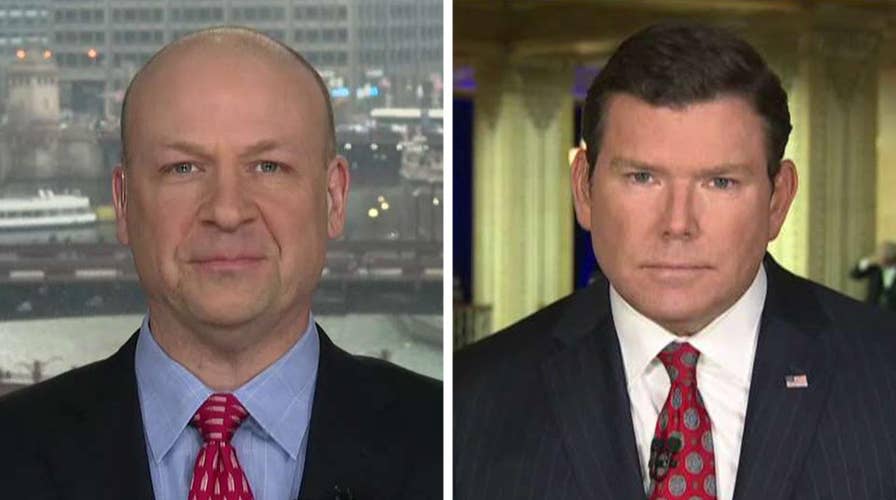President Trump backtracks on threat to close border with Mexico
Trump threatens tariffs if flow of drugs, illegal immigrants from Mexico doesn't stop; insight and analysis from the 'Special Report' All-Star panel.
Let’s hope that President Trump’s “one-year warning” issued to Mexico Thursday to halt the flood of illegal drugs and migrants entering the U.S. – or face a border closure and new tariffs – will influence Mexico to make some real changes.
Unfortunately, the media’s continual exaggerations of the dangers of closing the border may give Mexico the idea that the U.S. lacks the willpower to carry through on the president’s threat. If Mexican leaders conclude Trump is bluffing, there will be little reason for them to change their behavior.
Take the headline this week in the Washington Post, sternly warning: “U.S. would run out of avocados in 3 weeks if border is closed.” USA Today, NBC News, CBS News, CNN, and many other media outlets have run virtually identical headlines.
CHARLIE KIRK: TRUMP’S TOUGH STAND ON ILLEGAL IMMIGRATION FROM MEXICO IS GETTING RESULTS
The stories all paint a simple picture: we would soon have no avocados to eat unless we keep getting them from Mexico. After all, avocados can’t be stored for more than three weeks, and nearly 90 percent of our current imports come from Mexico.
No more guacamole. No more avocado toast.
Trade benefits both the United States and Mexico. There would be real costs from closing the border, but the news media’s dire predictions wouldn’t come true.
The news media are hyping avocados the most because they think that will strike close to home with people. But despite the certainty of these news stories, avocados wouldn’t disappear even if the border was closed for months.
The economics are straightforward. Mexico grows about 34 percent of the world’s avocados, and they account for almost half the exports. But other major producers include the Dominican Republic, Peru, Colombia and Chile.
The United States imports fewer avocados than the European Union, Canada and Japan combined. If the U.S.-Mexico border is closed, avocados that would have shipped to these other countries would be shipped to the U.S., while the avocados that Mexico normally sends to the U.S. would now go to other countries.
The price of avocados could go up a little, since it’s more costly to ship from South America. But we wouldn’t run out of avocados or any other foods.
The U.S. imports about $26 billion in food from Mexico each year. That’s just a small fraction of the $1.62 trillion that Americans spent on food and beverages in 2017.
The No. 1 food and beverage import from Mexico is beer, with a value of $3.3 billion annually. But plenty of substitutes are brewed in the U.S., which annually spends $35 billion on beer.
There are places along the border with Mexico that would bear a disproportionate burden from a shutdown. But the news media are exaggerating the costs to the U.S.
What about the costs of continuing to have a porous border through which illegal immigrants can cross?
Take just the costs of education. The average per-pupil cost of public schooling (including the costs of facilities) is over $13,200 per year.
Conservatively, approximately 540,000 school-age illegal immigrants (ages 5 to 17) live in the U.S., along with another 2.54 million U.S.-born children of illegal immigrants. Their schooling costs taxpayers at least $41 billion a year. That figure increases if these students go on to public colleges.
President Trump is rightly concerned that a porous border is hazardous to national safety.
The Crime Prevention Research Center, of which I am president, recently found that illegal immigrants in Arizona are at least 142 percent more likely to be convicted of a crime than other Arizonans. These crimes tend to be more serious, and illegal immigrants are 45 percent more likely to be gang members than prison inmates who are American citizens.
If illegal immigrants in the rest of the U.S. commit crimes at the same rate as illegal immigrants in Arizona, a nationwide population of 11.3 million illegal immigrants would mean an additional 1,647 murders each year.
That means the murder count would be 11 percent higher than it otherwise would be. There would also be 8,900 more rapes, 20,000 more robberies, and 53,000 more aggravated assaults.
Should President Trump eventually decide to close the border, his economic advisers want to keep the freight lanes open so commerce would continue unabated. If the president does so and closes the border to people, the economic costs of a shutdown would be much smaller.
Still, it might not ever be necessary to close the border at all. The threat alone has already started moving Mexico in the right direction to stop the throngs of Central Americans who travel through the country up to the U.S.
It is not obvious what Mexico stands to gain from Central Americans traveling to our country. After all, these aren’t Mexican citizens.
CLICK HERE TO GET THE FOX NEWS APP
The problem of illegal drugs is much more difficult to solve.
Trade benefits both the United States and Mexico. There would be real costs from closing the border, but the news media’s dire predictions wouldn’t come true.









































